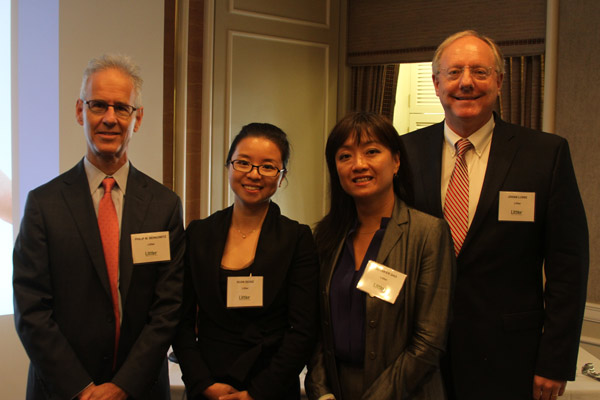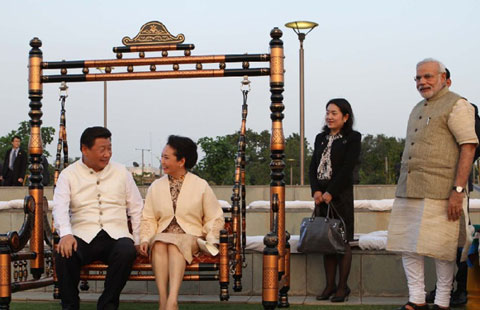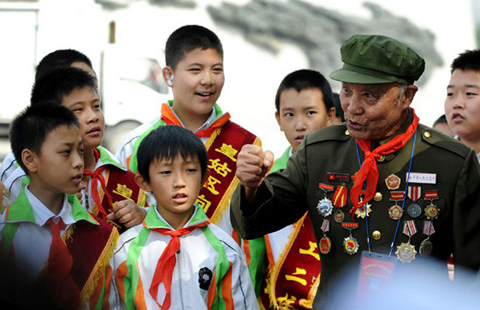Chinese companies in US urged to learn the employment laws
Updated: 2014-09-18 06:55
By AMY HE in New York(China Daily USA)
|
||||||||
 |
|
US employment law experts at a panel hosted by the China General Chamber of Commerce USA and Littler Mendelson law firm. From left: Philip Berkowitz, US practice co-chair of international employment at Littler Mendelson; Huan Xiong, associate at Littler Mendelson; Jennifer Gao, director of Berkeley Research Group; Johan Lubbe, US practice co-chair of international employment at Littler Mendelson. Amy He / China Daily |
As more Chinese companies set up business in the United States, they need to know how to navigate the country's employment laws, which may differ greatly from China's, US employment lawyers said at a seminar on Wednesday in New York.
Chinese companies are often "targets" of many kinds of employment claims, sometimes because they are unaware of aspects of US employment law and at other times because what works in China's culture doesn't work in America, said Philip Berkowitz, US practice co-chair of international employment at the Littler Mendelson law firm.
"Many companies from foreign countries have set up businesses here and many of them have learned very hard lessons. Many companies from other countries who were active here before the Chinese were active were targets of lawsuits, and so I think it's really critical and essential that the Chinese companies who come here get the benefits of the lessons that have already been learned by some of the people who got here before," Berkowitz told China Daily on the sidelines of an employment law seminar hosted by the China General Chamber of Commerce USA.
Chinese companies are increasingly faced with more employment-related lawsuits, generally because there are more companies doing business here and because Chinese companies are making the mistake American companies once did while conducting business in China, he said, which is to import Chinese workforce practices over to the US without any adaptation at all.
"We're seeing Chinese companies just act as the American companies often have done, which is, ‘I'm an American company, so I'm going to staff the company with Americans. I'm going to try to export my US policies overseas. I'm going to rely on employment at will," he said.
"You can't act that way. You have to respect the local culture and the local laws, and just as Americans have made those mistakes, I think the Chinese are unfortunately making the same mistakes. As my colleague said, you have to remember to wear your American hat when you're doing business here."
Companies that operate in the US may often ask potential employees or current employees information that may be deemed discriminatory by US employment law, such as age, gender, ethnicity and marital status. Questions pertaining to those details may be culturally acceptable in China, but asking them in the US may provide the grounds for a discrimination lawsuit.
"Federal agencies and the New York division on human rights expressively prohibit US employers or New York employers to seek this information from their employees. The reason is that it is assumed that request for such information would affect hiring decisions, which could be potentially discriminatory," Huan Xiong, an associate at Littler, said at the seminar held at the Cornell Club in Manhattan.
"For example, in Chinese culture, we're very open about age. It's probably due to the fact that we're always asked about such information, whether when applying to school or applying for jobs," she said. But mandatory retirement, which is practiced in China with female workers retiring at age 55 and males at 60, is not required in the US and often causes problems for Chinese workers who aren't aware and are not careful with their language, she said.
"An expatriate employee was working in the US and didn't know really well about age discrimination, and he always said this comment to older colleagues, 'Why don't you just retire and enjoy life?' or 'People in China your age have already retired!' His colleagues feel very uncomfortable about comments like that," she said.
amyhe@chinadailyusa.com

 President Xi and wife play swing in Modi's home state
President Xi and wife play swing in Modi's home state
 China's first Hermes Maison opening in Shanghai
China's first Hermes Maison opening in Shanghai
 9.18 Incident marked in China
9.18 Incident marked in China
 PLA's 'Gold Helmet' air battle contest takes off
PLA's 'Gold Helmet' air battle contest takes off
 Get together in space: experts
Get together in space: experts
 FTA high on agenda of China, Sri Lanka
FTA high on agenda of China, Sri Lanka
 ZTE's ZMAX makes debut
ZTE's ZMAX makes debut
 Tian'anmen Square dresses up for National Day
Tian'anmen Square dresses up for National Day
Most Viewed
Editor's Picks

|

|

|

|

|

|
Today's Top News
Xi, Modi set friendly tone for visit
Chinese naval chief debuts at Seapower forum
Chinese like trade, FDI, not acquisitions: Survey
Multilingual services bills on Brown's desk
Baidu speeds up online commerce
Ma named 'Asia Game Changer of the Year'
FDI dips for 2nd straight month
SF airport launches bilingual website for Chinese tourists
US Weekly

|

|







